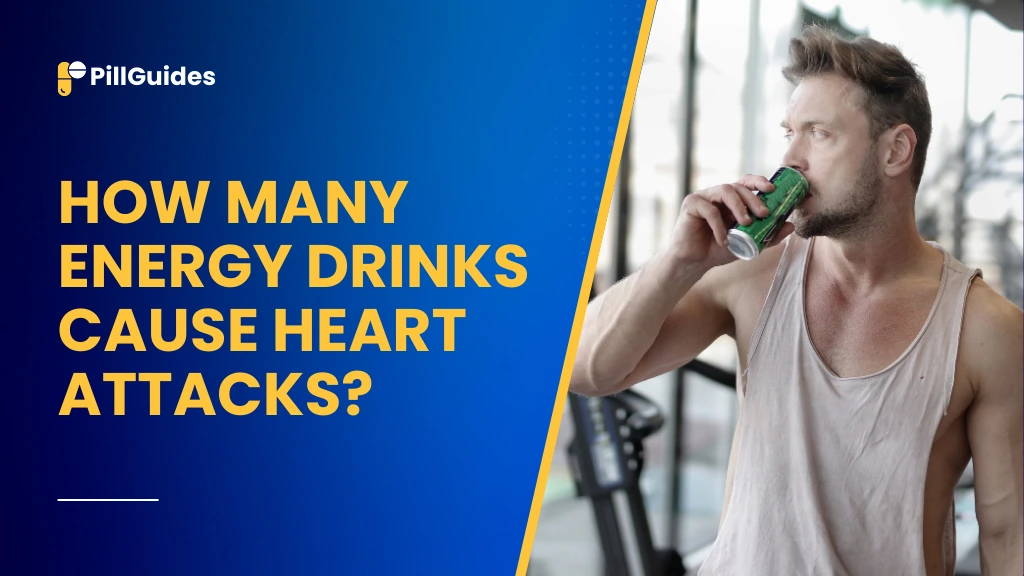People both among students and professionals tend to prefer energy drinks to get energy and concentration. Are they safe for your heart? “How many energy drinks cause heart attacks?” is a question asked by many people. For some of us, depending on our health and lifestyle, the answer is yes too much of it can cause many heart risks, but excessive consumption is unequivocal.
In this article, science is reviewed behind energy drinks and their risk to heart health, as well as the risks of consuming energy drinks in excess. You’ll get insights into ingredients, expert recommendations as well as tips for safer usage so you can balance your energy needs without compromising your health.
Understanding Energy Drinks and Their Ingredients
Beverages are known as energy drinks and they are intended to increase alertness, energy and focus. They typically contain high levels of:
- Caffeine: Most energy drinks are the primary stimulant.
- Taurine: A known amino acid that may increase athletic performance.
- Sugars: Contributing to the drink’s energy boost in excessive amounts.
- B Vitamins: It’s claimed to help in energy production, but surely it’s insignificant compared to caffeine, sugar.
Too much of these ingredients can provide both short-term benefits and long term risks.
How Energy Drinks Affect Your Heart
Energy drinks primarily impact your cardiovascular system in the following ways:
- Increased Heart Rate: Caffeine can speed up your heartbeat, which isn’t good for everyone.
- Elevated Blood Pressure: Sustained hypertension may be a result of overconsumption.
- Heart Palpitations: After drinking many energy drinks, many people report irregular heartbeats.
For most healthy adults occasional consumption isn’t likely to be that issue but excessive consumption has been shown to cause such severe heart complications..
How Many Energy Drinks Are Considered Safe?
The amount of energy drink consumption which is safe for each individual depends on things like age, weight, and present health conditions. General guidelines suggest:
- 400 mg of Caffeine Daily: Healthy adults should limit caffeine intake to 400 mg per day from foods and beverages, including those containing coffee, tea, cocoa, colas, and energy drinks or supplements that contain caffeine, explained the FDA.
- One to Two Energy Drinks Per Day: In some cases caffeine may be toxic if you exceed this limit.
Even one energy drink can be dangerous for those teenagers as well as people with pre-existing heart problems.
How Energy Drinks Can Lead to Heart Attacks
- Caffeine Overdose: Consuming too much caffeine in too short a time may occasion the arrhythmias which increases the risk of heart attacks.
- Sugar Overload: Sugar levels can lead to obesity, diabetes and heart diseases.
- Dehydration: So energy drinks can be diuretics which can give you dehydration and it may put stress on your heart.
Individuals frequently mistake energy drinks as fuel and continue to over exert themselves, increasing their risk for cardiovascular complications even further.
Case Studies: Real-Life Examples of Energy Drink Risks
- Young Adults: Reports of healthy teenagers having heart attacks due to excessive energy drink consumption have been made a few times.
- Athletes: Sudden cardiac arrest often results from over consumption in cases of intense physical activity.
- Individuals with Heart Conditions: Even moderate consumption may put those with underlying heart problems at risk.
Alternatives to Energy Drinks for Sustained Energy
If you’re looking for safer ways to boost energy, consider the following alternatives:
- Green Tea: A natural source of both caffeine and antioxidants.
- Balanced Meals: Make sure that these nutrients include protein, healthy fats and complex carbohydrates.
- Hydration: Electrolyte water can help keep energy levels up without the down side of energy drinks.
- Adequate Sleep: The number one way to restore energy naturally.
Signs You’re Consuming Too Many Energy Drinks
It’s essential to recognize the warning signs of overconsumption:
- Persistent headaches.
- Jitters or anxiety.
- Heart palpitations or irregular heartbeat.
- Frequent urination or being dehydrated.
- Insomnia or restlessness.
If you have these symptoms, it’s best to decrease your intake or consult with a healthcare professional.
Tips for Safe Consumption of Energy Drinks
- Limit to One Drink Per Day: Drink no more than the recommended serving.
- Avoid Mixing with Alcohol: You can combine energy drinks with alcohol and make risks multiply.
- Read Labels Carefully: There are drinks with higher than expected caffeine levels.
- Avoid Before Physical Activity: They can also increase our heart rate unpredictably during exercise.
- Choose Low-Sugar Options: In an effort to reduce the long term health issue.
The Long-Term Effects of Energy Drink Consumption
While occasional consumption may seem harmless, regular or excessive intake of energy drinks can have significant long-term effects on your health:
- Heart Health Issues: But chronic use can cause hypertension, irregular heart rhythms, and increase the chance of heart attacks.
- Mental Health Impact: Anxiety, insomnia, and mood disorders may be related to high caffeine levels.
- Kidney Damage: Then, over time, the high sugar and other stimulants can wear away at kidney function.
- Dependence and Tolerance: Caffeine dependence and high doses of caffeine needed to feel alert can result when it’s used regularly.
- Nutritional Deficiencies: A nutritionally poor diet that replaces nutritious beverages with energy drinks is common.
A way to raise awareness of these long term effects can be to get people to make more health aware decisions and stop using energy drinks.
The Role of Lifestyle in Mitigating Energy Drink Risks
Energy drinks are no threat, but other lifestyle factors most influence whether their impact on your health will be good or bad. Here’s how you can reduce the potential dangers:
- Maintain a Balanced Diet: Sustainable energy can come from nutrient rich foods which decreases the need for energy drinks.
- Regular Exercise: Natural energy levels can be boosted by moderate exercise and so can heart health.
- Stress Management: Stress is increased energy drink consumption, so do mindfulness or practice yoga or meditation.
- Adequate Sleep: Get 7-9 hours sleep per night so you let your body recharge naturally.
- Hydration: To stay energised but without stimulants, drink lots of water throughout the day.
These habits will assist you in reducing the amount of energy you drink, while keeping your well being on your side.
Conclusion
Energy drinks do offer a short term energy boost, but too much of a bad thing can lead to serious risks, especially to your heart health. What that means is that it’s important to understand the potential dangers, like increased heart rate, high blood pressure, and risk of heart attacks.
There is little evidence that moderate drinking is harmful for healthy individuals, but several energy drinks taken together in a short space of time, or drinking energy drinks and other stimulants, can cause severe results. Reducing your risks can be achieved through being mindful of your consumption, reading your labels and living a balanced life.
If you have any symptoms like chest pain, dizziness, rapid heartbeat after consuming energy drinks, go to the doctor. Remember your health should always be first, and energy should come from healthy sources such as nutritious foods, restful sleep and workout.
Disclaimer
This article is for informational purposes only and should not replace medical advice. Always consult a healthcare professional for concerns about energy drink consumption or heart health.
Read More: Chip Gaines Heart Attack Rumors: The Truth and Essential Heart Health Tips
FAQ
1. Can drinking one energy drink cause a heart attack?
One energy drink won’t make most healthy individuals have a heart attack. Unfortunately, those with pre existing heart conditions might be at risk.
2. How many energy drinks are really bad for you?
If you’re consuming more than two energy drinks a day, you can have dangerous side effects like arrhythmias, high blood pressure, and increased risk of a heart attack.
3. Are sugar free energy drinks safer for your heart?
Although they have substantially decreased the risk of sugar associated health problems, these sugar free options still have high amounts of other stimulants like caffeine that can affect your heart health.
4. Are teenagers safe when they drink energy drinks?
Teens just aren’t as sensitive to caffeine as adults, and so are at greater risk of developing a dependency on it, which is why energy drinks aren’t recommended for teenagers.
5. What should I do if I get heart palpitations after drinking an energy drink?
Stop consuming the drink and stay hydrated. If symptoms persist see a healthcare professional.










